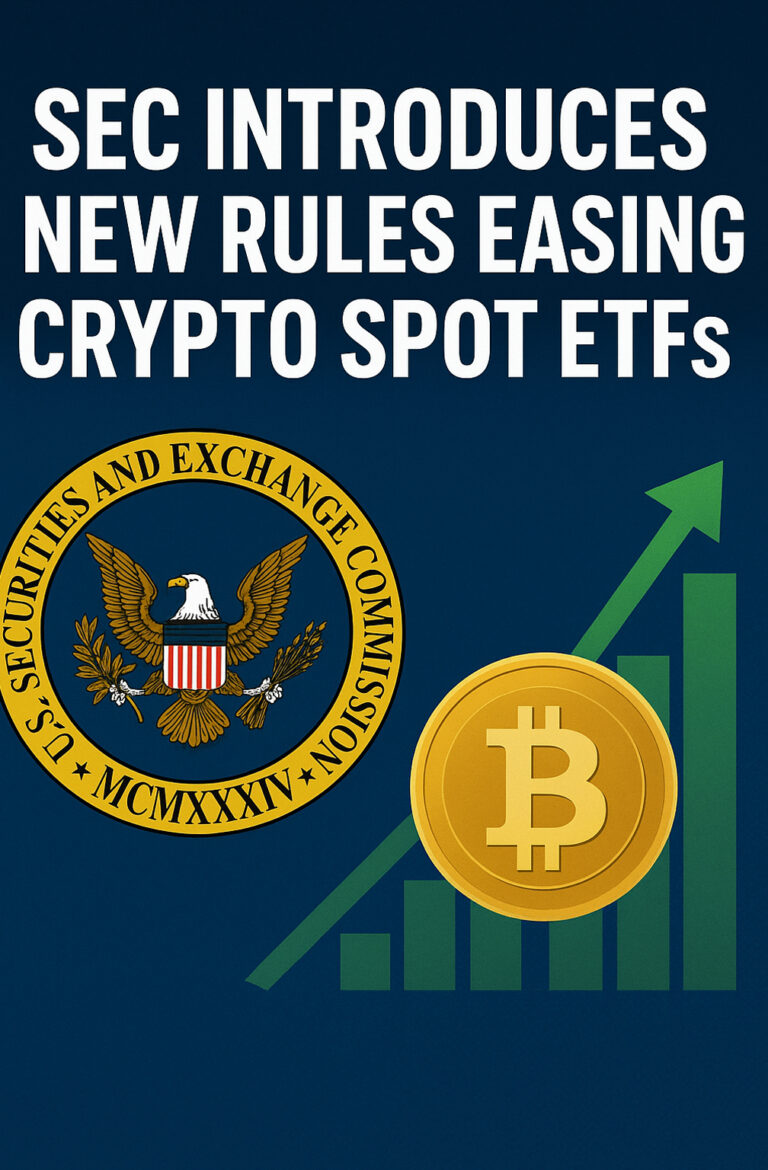Premium Biz Post – The SEC introduces new rules easing crypto spot ETFs, marking a significant shift in how investors can access cryptocurrency-linked financial products. This decision is seen as a breakthrough moment for digital asset adoption, as it streamlines approval processes and potentially broadens market participation. Investors, institutions, and market analysts alike are closely watching how these regulatory updates will reshape the U.S. financial landscape and accelerate crypto integration into mainstream portfolios.

The Background: SEC’s Stance on Cryptocurrency
For years, the U.S. Securities and Exchange Commission (SEC) has maintained a cautious approach toward cryptocurrency-based investment vehicles. Historically, the agency rejected numerous applications for spot Bitcoin and Ethereum ETFs, citing concerns over market manipulation, lack of investor protection, and insufficient surveillance mechanisms.
While futures-based crypto ETFs received approval in earlier years, direct exposure through spot ETFs remained elusive. Futures ETFs only provided indirect exposure to cryptocurrency prices, often resulting in tracking inefficiencies, higher management costs, and investor frustration.
The recent rule adjustment marks a turning point. By easing the pathway for spot ETF registration, the SEC acknowledges the maturing digital asset market, improved surveillance agreements, and increased demand for regulated investment products.
What the New Rules Mean
The newly introduced rules are designed to simplify the listing and registration process for spot cryptocurrency ETFs. The SEC’s adjustments aim to:
- Streamline Registration: ETF issuers will face less bureaucratic friction when filing applications, reducing delays that previously stretched into months or years.
- Enhance Transparency: Clearer guidelines allow issuers to meet disclosure requirements without ambiguity.
- Improve Market Oversight: Collaboration with regulated exchanges ensures that market manipulation risks are mitigated.
- Broaden Accessibility: Institutional investors, retail traders, and retirement funds will have more opportunities to access digital assets through regulated investment vehicles.
This framework effectively brings crypto ETFs closer to traditional financial products like equity or commodity ETFs, providing a safer, more accessible investment gateway.
Investor Reactions and Market Sentiment
Market response to the SEC’s announcement has been largely positive. Cryptocurrency prices, particularly Bitcoin and Ethereum, showed upward momentum as traders anticipated stronger institutional demand. Analysts suggest that spot ETFs could drive billions of dollars in new inflows, particularly from conservative investors who avoided unregulated crypto exchanges.
Institutional players, including asset management giants and pension funds, have already expressed interest in launching spot ETFs under the new framework. BlackRock, Fidelity, and other global firms are expected to expand their crypto offerings, creating a competitive environment in the ETF sector.
Retail investors, on the other hand, welcome the prospect of simplified access to cryptocurrency exposure through traditional brokerage accounts, without the complexities of wallets, private keys, or direct exchange risks.
Potential Benefits of Spot ETFs
The introduction of new SEC rules carries numerous advantages for the investment community:
- Greater Legitimacy for Crypto: Regulatory approval strengthens cryptocurrency’s reputation as an asset class.
- Portfolio Diversification: Spot ETFs enable investors to integrate Bitcoin, Ethereum, and other crypto assets into retirement funds and diversified portfolios.
- Cost Efficiency: Direct exposure reduces the inefficiencies associated with futures-based products.
- Increased Liquidity: Institutional participation is expected to boost overall trading volume and price stability.
- Enhanced Security: Investors gain access to regulated custody solutions rather than relying on third-party crypto exchanges.
Baca Juga : ”Plastic Waste to Bags A Creative Solution to Reduce Pollution”
Challenges and Criticism
Despite the enthusiasm, not everyone agrees that these changes are entirely beneficial. Critics warn that:
- Market Volatility Remains: Even with regulation, cryptocurrencies remain highly volatile assets.
- Regulatory Risks: Future political shifts could reverse supportive policies.
- Overexposure Risks: Easy access may lead inexperienced investors to over-allocate funds into crypto.
- Centralization Concerns: Some argue that ETFs undermine the decentralized ethos of blockchain by consolidating assets under institutional custodians.
These concerns highlight the delicate balance regulators must maintain: promoting innovation while protecting investors from systemic risks.
Global Implications
The SEC’s move is expected to influence other regulatory agencies worldwide. Europe, Canada, and parts of Asia have already approved spot crypto ETFs, but the U.S. market carries unique weight due to its size and global financial influence.
If successful, the U.S. framework may encourage countries with stricter stances—such as India and China—to reevaluate their policies. This could pave the way for broader international adoption, potentially leading to global harmonization in crypto regulations.
Economic Impact
Analysts estimate that spot ETFs could bring in $50–100 billion in capital inflows over the next two years. Increased adoption could:
- Strengthen the U.S. as a global hub for digital asset innovation.
- Boost revenues for financial institutions managing ETF products.
- Generate tax revenues from trading activities.
- Encourage blockchain startups and supporting industries, such as custodians and compliance firms.
This influx of capital is not only significant for the crypto industry but also for the broader U.S. economy.
Industry Perspectives
Key figures in the financial and crypto industries have voiced their opinions:
- Crypto Exchanges: Platforms like Coinbase and Kraken see the decision as validation of their years-long push for regulatory clarity.
- Institutional Managers: Firms such as Fidelity and BlackRock expect ETFs to expand their client base.
- Crypto Advocates: Industry leaders believe this move will increase mainstream acceptance while educating the public about blockchain technology.
- Skeptics: Traditional economists remain cautious, emphasizing the speculative nature of crypto assets.
What This Means for Retail Investors
For everyday investors, the rule changes provide an opportunity to access cryptocurrency in a safer, regulated way. Through spot ETFs, they can:
- Buy and sell crypto exposure through standard brokerage platforms.
- Avoid technical complexities of wallets and blockchain transactions.
- Diversify portfolios without overcommitting to high-risk assets.
- Enjoy greater transparency regarding costs, risks, and asset management.
This accessibility may open doors for millions of new participants who previously hesitated to enter the crypto space.
The Future of Crypto ETFs
The crypto ETF market is still in its early stages, and growth potential remains immense. Over the next decade, we may see:
- Expansion into multi-asset crypto ETFs covering a range of coins.
- Integration of tokenized real-world assets alongside cryptocurrencies.
- Hybrid ETFs combining crypto with traditional commodities like gold or energy.
- Enhanced investor protections as regulations evolve.
The SEC’s decision signals the beginning of a new era, where digital assets gradually merge into mainstream finance.
The SEC’s regulatory update marks a defining moment for the financial industry. By lowering barriers to entry for cryptocurrency spot ETFs, the agency has opened new investment pathways for both institutional and retail investors.
While challenges remain—ranging from volatility to ongoing regulatory debates—the new framework highlights a growing recognition of cryptocurrency’s role in global finance. The SEC introduces new rules easing crypto spot ETFs not just as a regulatory measure, but as a step toward bridging traditional finance with digital innovation.



